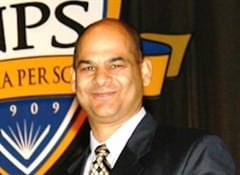Sunil Dutta, who has worked 17 years in the Los Angeles Police Department, has some advice for anyone encountering him on the job: do whatever I say and don’t complain, or I will hurt or kill you.
Here is Dutta’s advice, in his own words, from his Tuesday Washington Post editorial:
Even though it might sound harsh and impolitic, here is the bottom line: if you don’t want to get shot, tased, pepper-sprayed, struck with a baton or thrown to the ground, just do what I tell you. Don’t argue with me, don’t call me names, don’t tell me that I can’t stop you, don’t say I’m a racist pig, don’t threaten that you’ll sue me and take away my badge. Don’t scream at me that you pay my salary, and don’t even think of aggressively walking towards me. Most field stops are complete in minutes. How difficult is it to cooperate for that long?
Revealingly, every action Dutta says a person he confronts should refrain from taking is a nonviolent action. In contrast, every action Dutta says he, as a cop, may take in response is violent — an assault or a murder.
Dutta’s advice amounts to this: Give up on exercising any of your rights — even the right to free speech — and act as an absolute slave when a cop accosts you.
Reading Dutta’s outrageous advice, one is tempted to say he should be sent back to the police academy to learn the basics. But, things have changed in America with the rise of SWAT. Dutta pretty much is the police academy. He is an adjunct professor of homeland security and criminal justice at Colorado Technical University in addition to working for the LAPD. Dutta’s biography on the university website relates:
Dr. Dutta’s teaching experience goes back two decades and includes teaching police academy instructors as well as high-level police and military professionals at the International Law Enforcement Academy. He has taught at all levels, including high school, community college, and university.
Dutta’s disturbing views are commonplace among police due to a dangerous change in attitude that has swept through the police profession over the last few decades. Rutherford Institute President John W. Whitehead explores this change and how it is reinforced in modern police education in his June article “Just Shoot: The Mindset Responsible for Turning Search Warrants into Death Warrants, and SWAT Teams into Death Squads.” While it is absolutely worthwhile to read Whitehead’s entire revealing article, a couple paragraphs jump out as particularly relevant:
Yet the tension inherent in most civilian-police encounter these days can’t be blamed exclusively on law enforcement’s growing reliance on SWAT teams. It goes far deeper, to a transformation in the way police view themselves and their line of duty. Specifically, what we’re dealing with today is a skewed shoot-to-kill mindset in which police, trained to view themselves as warriors or soldiers in a war, whether against drugs, or terror, or crime, must “get” the bad guys—i.e., anyone who is a potential target—before the bad guys get them. The result is a spike in the number of incidents in which police shoot first, and ask questions later.
…If ever there were a time to de-militarize and de-weaponize police forces, it’s now, starting at the local level, with local governments and citizens reining in local police. The same goes for scaling back on the mindset adopted by cops that they are the law and should be revered, feared and obeyed.
Dutta’s editorial is one more indication that police brutality in America is not just the result of “a few bad cops.” Instead, it is caused in large part by serious institutional problems arising from changes in how cops are taught to perform their jobs and how cops view their interactions with other people.
These institutional problems create danger. They make police brutality more likely, and they drive people to act out of fear — as Dutta recommends — as cops’ slaves instead of as free individuals with rights including rights against self-incrimination and warrantless searches.
This danger is compounded by the US government delivering weapons of war to local police throughout America without even the semblance of restraint.
To substantially reduce police brutality, the understanding must be restored among the vast majority of police that the disturbing views Dutta expresses in his editorial are unacceptable in the police profession.


